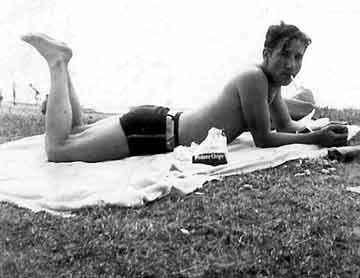I miss my paternal grandparents. They were fantastic. I spent a lot of time with them growing up. Perhaps that’s why I have such a special fondness for the Greatest Generation.
My super cool grandfather back in the day:

Members of the Greatest Generation were children during The Great Depression. Their college years were interrupted by World War II. They remember the first televisions, and the invention of the atomic bomb. They raised their children in the ’50s, during the threat of the Cold War, then saw (some of) them turn into hippies and counterculture-types, and/or go off to fight in Vietnam. They saw man’s first steps on the moon. They witnessed the rise of a myriad of musical traditions: jazz, swing, big band, bebop, do wop, psychadelic, rock and roll, disco, punk rock. For the last twenty years or so, they’ve been retired. Now they surf the internet.
I’m fascinated by trying to understand all that they’ve seen and done in their lifetimes, which spanned much of the twentieth century. I think we’re going to see and feel a big shift in things once their generation is gone, though I’m not sure how to explain what I mean by that.
My grandmother, holding my dad as a baby:

I work in Alzheimer’s and dementia research so I spend a lot of time around people between the ages of 80 and 100, most of whom have little to no cognitive impairment. In addition to testing their memories on a regular basis, I teach them to use computers and provide technical support. These things are all well and good, but the best part for me is getting to know the people who are volunteering for the study. It doesn’t keep me from missing my grandparents, but it helps, and it has definitely changed my perspective on aging, and on life in general.
A few days ago one of my research participants asked me whether I’d seen the recent New York Times article entitled “How Not To Offend the Aging: A Primer.” I had not, and she described it to me.
One of my biggest pet peeves is hearing the way some people talk to seniors. They shout, without finding out first whether or not the person is able to hear them at a normal volume. They speak more slowly, and in a phony, sing-song, patronizing tone of voice. I don’t understand why people do this. When my grandparents were dying and ‘caretakers’ would come in the room and speak to them this way, it infuriated me.
The woman who told me about the NYT article asked me to pass it on to everyone I know who interacts with seniors. I promised I would.

